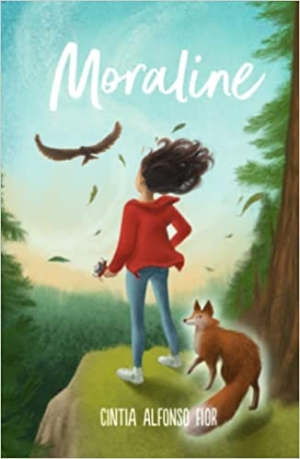Moraline
Moraline is a gentle, empowering novel in which young advocates find their work enhanced by moments of magic.
In Cintia Alfonso Fior’s appealing novel Moraline, a fidgety girl who loves to run finds her place and purpose at a new school.
Moraline and her family move from New York to San Diego. At her new middle school, fitting in is tough. As the story opens, she is running through the forest among the sequoias, evading classmates who humiliated her with a cruel prank during a school camping trip. Help arrives in the form of a shapeshifting Lakota messenger who reminds Moraline of her Native American heritage. Her father is from the Ohlone tribe of California. Mahkah, the messenger, tells her that she has a mission to balance the Four Winds.
As Moraline overcomes the initial conflict of dealing with her bullies and takes on the more nebulous quest for balance in the universe, the book’s tension decreases. She is fast to find a new circle of friends from diverse backgrounds, including Serenity, the white daughter of a widowed soldier; Edmundo, whose Latino family works on an avocado farm; and Ammi, a refugee from the Congo. The four feel united by their mutual responsibility for a golden baby fox that they find in the woods. They name him Nagi after Moraline discerns his name in the wind, and they make a home for him in an abandoned hut.
In subsequent episodic chapters, the foursome contend with issues plaguing each of them, including Serenity’s grief over the loss of her mother; the threat of violence due to Ammi’s skin color; and occupational asthma, an illness caused by exposure to toxic agricultural chemicals, which lands Edmundo in the hospital. There are instances of caring and kindness that support the book’s messages of hope, and gentle lessons regarding conflict resolution and stewardship for the earth and its living beings are delivered too. For example, when Serenity’s father proposes killing the snails that are pestering his fruit trees, his daughter convinces him to come up with a more humane solution; elsewhere, a dance competition is used as an alternative to fighting.
Still, the book is not strictly realistic. Although Moraline and her friends contend with real-world problems and develop logical solutions to them, earning themselves the titles of “little advocates,” the story includes elements of magic to support its themes, too. A crow doll, gifted to Moraline by the Lakota messenger, resides in her pocket and grows warm when she is on the right path. The appearances of animals, birds, and insects are used to suggest wonder and inspire interest in nature. Occasional illustrations capture these moments in an appealing manner.
With its helpful list of social justice resources, Moraline is a gentle, empowering novel in which young advocates find their work enhanced by moments of magic.
Reviewed by
Suzanne Kamata
Disclosure: This article is not an endorsement, but a review. The publisher of this book provided free copies of the book and paid a small fee to have their book reviewed by a professional reviewer. Foreword Reviews and Clarion Reviews make no guarantee that the publisher will receive a positive review. Foreword Magazine, Inc. is disclosing this in accordance with the Federal Trade Commission’s 16 CFR, Part 255.

